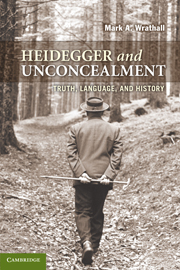Book contents
- Frontmatter
- Contents
- Acknowledgments
- Credits
- Introduction
- Part I Truth and Disclosure
- Part II Language
- 5 Social Constraints on Conversational Content: Heidegger on Rede and Gerede
- 6 Discourse Language, Saying, Showing
- 7 The Revealed Word and World Disclosure: Heidegger and Pascal on the Phenomenology of Religious Faith
- Part III Historical Worlds
- Works by Heidegger
- Index
- References
7 - The Revealed Word and World Disclosure: Heidegger and Pascal on the Phenomenology of Religious Faith
Published online by Cambridge University Press: 05 June 2012
- Frontmatter
- Contents
- Acknowledgments
- Credits
- Introduction
- Part I Truth and Disclosure
- Part II Language
- 5 Social Constraints on Conversational Content: Heidegger on Rede and Gerede
- 6 Discourse Language, Saying, Showing
- 7 The Revealed Word and World Disclosure: Heidegger and Pascal on the Phenomenology of Religious Faith
- Part III Historical Worlds
- Works by Heidegger
- Index
- References
Summary
In what may be his most concise explanation of the nature of phenomenology, Heidegger explains that it consists in grasping “its objects in such a way that everything about them which is up for discussion must be treated by exhibiting them directly and demonstrating them directly” (GA 2: H. 35). That means that phenomenology always proceeds from out of a direct experience of the objects in question, and it attempts to address and resolve problems in philosophy by producing a direct apprehension of the relevant phenomena.
A phenomenology will be in order, then, whenever a problem is affected by the fact that the object under discussion is something that “proximally and for the most part does not show itself” (GA 2: H. 35), or when its appearance is distorted by theories or concepts inappropriate to the object in question.
- Type
- Chapter
- Information
- Heidegger and UnconcealmentTruth, Language, and History, pp. 156 - 174Publisher: Cambridge University PressPrint publication year: 2010



